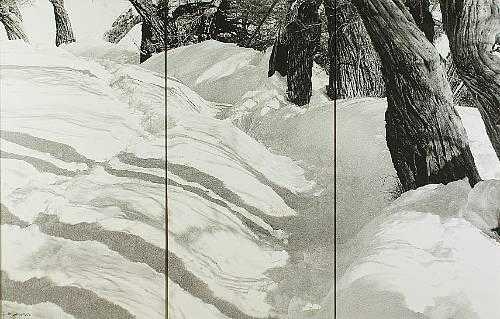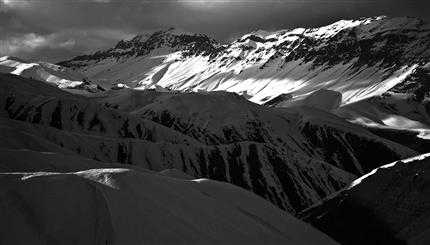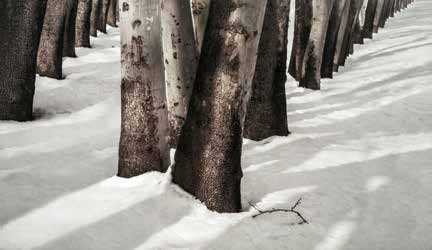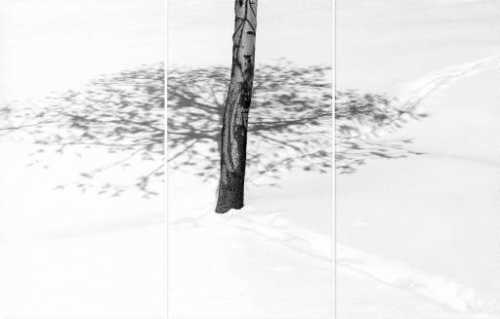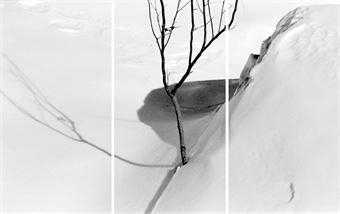- Snow White Series 1998
- inkjet print on canvas
- Photography
- 257 * 164.5 cm
- Editions: 1
- Edition No. 1
- Signed in Farsi and dated '98 lower left, numbered 1/1, framed
Each panel; 164.5 x 85 cm
Artwork Description
"Not being able to feel the pleasure of seeing a magnificent landscape with someone else is a form of torture. That is why I started taking photographs. I wanted to eternalise those moments of passion and pain". – Abbas Kiarostami
Abbas Kiarostami's bold, thoughtful images of desolate natural landscapes represent a significant divergence from the anthropocentric, socio-political, urban aesthetic of his renowned cinema productions. In the Snow White series, Kiarostami makes a transition from the urban to the natural, and with it replaces political discourse with philosophical contemplation.
The photographs of the Snow White series were taken along Iran's Caspian coast during walks Kiarostami took in search of filming locations. The images he took were spontaneous and unplanned; immediate reactions to the stimuli of his surroundings, impulses catalyzed by feelings of awe and wonderment. Kiarostami himself states that his photographs were, "never produced to be shown". Yet once they were developed, the subjective significance of the instance they captured, their beauty and contemplative depth were far too profound to remain hidden.
The present image is an exemplary piece, reflecting all the crucial aspects of Kiarostami's agenda, and its philosophical significance rests both on its qualitative contrasts between man and nature, and also on Kiarostami's subjective interpretation of Iranian history. The tree, analogous to life and growth, is in symbolic conflict with the harshness and inhospitality of a snow-filled environment, but the resilience of the trees therein represents nature ability to harness opposing elements within a seemingly harmonious whole. The immediacy of nature, its self-regulating harmony, and its blind continuation are free from the mis-shapen flaws of a conflict ridden, dystopic, urban environment. Furthermore, the date during which Kiarostami's images were produced are highly significant: 1978-2006 spans not only Iran's turbulent Islamic Revolution, but the consequent war with Iraq and two further decades of political repression and civil unrest. Yet Kiarostami's calm, peaceful landscapes show no sign of this bloody legacy, a testament to natures indifference towards mankind.
An artist known foremost for his cultural scrutiny, in Snow White, Kiarostami urges us to transcend the blinkered realm of material, human concerns, and embrace the majesty and permanence of nature; a force which outlives our fragile and ephemeral lives.
Abbas Kiarostami's bold, thoughtful images of desolate natural landscapes represent a significant divergence from the anthropocentric, socio-political, urban aesthetic of his renowned cinema productions. In the Snow White series, Kiarostami makes a transition from the urban to the natural, and with it replaces political discourse with philosophical contemplation.
The photographs of the Snow White series were taken along Iran's Caspian coast during walks Kiarostami took in search of filming locations. The images he took were spontaneous and unplanned; immediate reactions to the stimuli of his surroundings, impulses catalyzed by feelings of awe and wonderment. Kiarostami himself states that his photographs were, "never produced to be shown". Yet once they were developed, the subjective significance of the instance they captured, their beauty and contemplative depth were far too profound to remain hidden.
The present image is an exemplary piece, reflecting all the crucial aspects of Kiarostami's agenda, and its philosophical significance rests both on its qualitative contrasts between man and nature, and also on Kiarostami's subjective interpretation of Iranian history. The tree, analogous to life and growth, is in symbolic conflict with the harshness and inhospitality of a snow-filled environment, but the resilience of the trees therein represents nature ability to harness opposing elements within a seemingly harmonious whole. The immediacy of nature, its self-regulating harmony, and its blind continuation are free from the mis-shapen flaws of a conflict ridden, dystopic, urban environment. Furthermore, the date during which Kiarostami's images were produced are highly significant: 1978-2006 spans not only Iran's turbulent Islamic Revolution, but the consequent war with Iraq and two further decades of political repression and civil unrest. Yet Kiarostami's calm, peaceful landscapes show no sign of this bloody legacy, a testament to natures indifference towards mankind.
An artist known foremost for his cultural scrutiny, in Snow White, Kiarostami urges us to transcend the blinkered realm of material, human concerns, and embrace the majesty and permanence of nature; a force which outlives our fragile and ephemeral lives.
More lots by Abbas Kiarostami
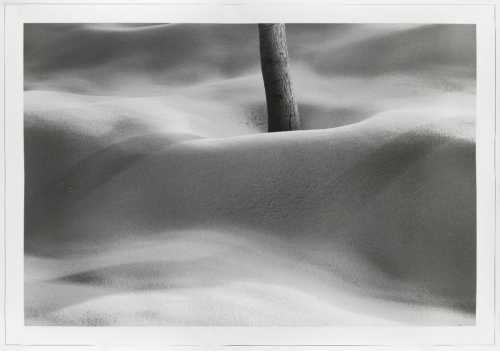
Untitled
Estimation
£1,000
1,163 USD
-
£1,500
1,744 USD
Sale Date
Rosebery's Auction
-
28 October 2022
Realized Price
23,060 USD
Min Estimate
13,898 USD
Max Estimate
19,396 USD
Average Artwork Worth
+33.17%
Average Growth of Artwork Worth
Sales Performance Against Estimates
Average & Median Sold Lot Value
2021 - 2025
Performance vs. Estimate
2021 - 2025
Sell-through Rate
2021 - 2025
